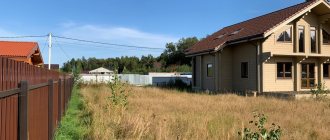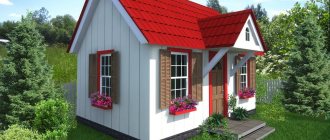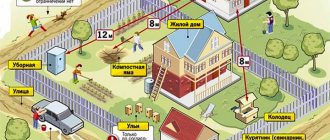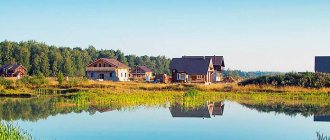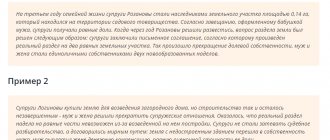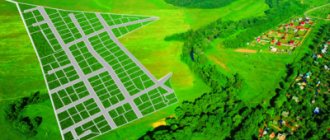Many people do not fully understand the difference between land plots provided for gardening and for individual housing construction.
But depending on the legal regime of the site, the purchase and sale procedure may differ.
Transactions for the acquisition of land in gardening partnerships have their own characteristics, which you need to know about before registration. We'll talk about all the subtleties in the article.
Legal regulation
The buyer of the plot should familiarize himself with the norms of the Land Code of the Russian Federation.
The code describes:
- what categories of land exist;
- existing land restrictions and encumbrances (for example, easements);
- procedure for conducting cadastral registration.
The rules for drawing up sales and purchase agreements are enshrined in Chapter 30 of the Civil Code of the Russian Federation.
General provisions on contracts are established in subsection 2 of this code. The main document is Law No. 218-FZ of July 13, 2015 “On State Registration of Real Estate”. The buyer becomes the owner only after the contract is registered with Rosreestr.
The registrar checks whether the parties to the transaction have the right to make a purchase and sale, and may refuse to enter information into the Unified State Register if there are violations of the law.
Law on gardening non-profit partnership
At the legislative level, the activities of partnerships are regulated by the following regulations:
- Civil Code of the Russian Federation;
- Federal Law On the conduct of gardening and vegetable gardening by citizens for their own needs and on amendments to certain legislative acts of the Russian Federation dated July 29, 2017 N 217-FZ;
- Land Code of the Russian Federation dated October 25, 2001 N 136-FZ.
Procedure
First, the buyer looks for a suitable plot. It does not matter whether the owner is in a partnership, the main thing is that the land is provided for gardening.
Important! There should be no registered buildings on the site. According to Russian law, the land follows the fate of the house, and not vice versa. The owner of the building may require the owner of the site to provide him with territory for the maintenance of his property.
To purchase land you will need:
- extract from the Unified State Register of Real Estate;
- a document confirming the legal transfer of ownership (privatization agreement, sale and purchase, gift, court decision, certificate of inheritance or other);
- cadastral passport, if available (from 2021, replaced by an extract from the Unified State Register of Real Estate);
- a certificate from the board of SNT, where the site is located, confirming that the owner has no debt on target and membership fees;
- certificates from PND and ND stating that the owner is not registered with these organizations;
- a certificate from the BTI about the availability of real estate on the site (the document must indicate that there are no buildings);
- consent of the spouse to complete the transaction, certified by a notary (if the owner is married).
The specified documents are not required to be submitted . But the buyer requires them to protect himself from invalidation of the transaction.
If the owner of the plot was not a member of the SNT, he must have agreements for the use of the common property of the partnership. The land owner must not have debts to the association of plot owners.
The purchase and sale agreement is drawn up by the parties independently.
The document should contain the following sections:
- information about the parties (full name, date of birth, place of residence, passport details of the seller and buyer);
- subject of the contract - the seller transfers, and the buyer pays for and accepts the land plot (the location of the plot, area, cadastral number, purpose and other information are indicated);
- rights and obligations of the parties - the seller is obliged to transfer the property within a certain period, and the buyer must pay for it (in this section you need to indicate who is obliged to register the transaction);
- cost and payment procedure - indicate the amount in rubles that is due to the seller, the method of payment (cash or transfer to a bank account), payment terms (before the transfer of the site, after the transfer or in parts);
- liability measures (penalty for late payment, compensation for actual losses incurred due to the guilty actions of the counterparty);
- final provisions - the procedure for resolving disputes, the duration of the agreement, the number of copies of the agreement, etc.;
- signatures, surnames and initials of the parties.
The parties will need 3 copies of the agreement: one each for the buyer and seller, and another original will be stored in Rosreestr.
When the contract is concluded, the land is transferred to the ownership of the buyer . For this purpose, a transfer and acceptance certificate is signed. The buyer and seller can do without a transfer deed if they themselves indicate this in the contract: this procedure is established in Article 556 of the Civil Code of the Russian Federation.
Next, the buyer applies to Rosreestr to register his right to the plot.
For the procedure you will need:
- application in the prescribed form;
- 2 originals of the purchase and sale agreement;
- copies of passport pages;
- confirmation of payment of state duty;
- power of attorney and passport of the representative, if the citizen has transferred the right to represent his interests to another person.
You can contact Rosreestr:
- in person by coming to the office;
- by sending an application by mail;
- through the MFC;
- electronic;
- at home (available to veterans and disabled people of the Second World War, disabled people of groups 1 and 2).
Important! You can contact Rosreestr before completing all payments under the contract.
The citizen submits documents to the registrar. Rosreestr specialists enter information into the land cadastre, which takes up to 10 working days. After this, 1 original agreement with a registration mark is returned to the new owner. At the request of the owner, an extract from the Unified State Register with up-to-date information is issued.
The following expenses are borne by the seller of the allotment during the registration process:
- 300 rubles for issuing an extract from the Unified State Register of Real Estate;
- 255 rubles for a certificate from the BTI;
- from 1600 to 2000 rubles you need to pay for certificates from the IPA and ND;
- from 1,100 rubles will be required to obtain the spouse’s consent to complete the transaction from a notary.
The buyer pays 2,000 rubles for registering the agreement with Rosreestr. These costs can also be borne by the seller by mutual agreement of the parties.
Is it possible to sell a non-privatized dacha in 2021
On average in Russia, such a service will cost 10,000 rubles. It will cost much more only in the capital.
But you should know that from 2021 it will be impossible to dispose of a plot of land without certain boundaries. The final stage is registration of property rights in Rosreestr.
You can only buy real estate that belongs to the owner by right of ownership. Carefully study the seller's title documents.
The rest of the area will have to be purchased under an additional agreement, which scammers can take advantage of. It is best to visit the local authority responsible for real estate transactions before making a transaction. There it will be possible to determine whether the acquired land is suitable for the purposes pursued by the buyer.
Features of the procedure for registering a transaction with the owner
The owner of the site must obey the decisions of the general meeting of SNT members. For example, it is necessary to pay target contributions in full, even if a person has recently become the owner of the land.
The new owner is not required to join SNT . In this case, separate agreements will be concluded with him for the use of the partnership’s infrastructure:
- electrical networks,
- roads,
- water supply, etc.
Tariffs are determined by the partnership. Formally, only a garden house can be built on the site. But if the plot is located on the territory of a populated area, the owner can build a permanent structure on it.
The house must meet a number of requirements:
- no more than 3 floors (no higher than 20 meters);
- there are load-bearing structures, utility networks - cold and hot water supply, electricity, sewerage, ventilation (houses up to 2 floors may not have water supply and sewerage);
- there is a postal address.
If all conditions are met, the premises are recognized as residential and you can register in it.
Is it advisable to buy land in SNT?
Such a site has its advantages and disadvantages. To understand whether you need such land or not, it is worth conducting an analysis of your needs, goals, and options for using the site. Let's look at them in more detail.
Differences between SNT and individual housing construction and DNP:
- It is allowed to build households on the individual housing construction site (no more than 3 floors). While the construction of residential buildings is not permitted on the territory of SNT and DNP;
- By purchasing a property in SNT, a person receives land far from the city or densely populated village. Often the land is located in rural areas. While individual housing construction territories are most often located in the vicinity of the city or in villages;
- the SNT and DNP site may be located in a place where roads and power lines are not laid. Such lands were not initially intended for housing development. But the lands of individual housing construction are intended exclusively for the construction of residential buildings on them. As a result of this, the authorities of cities and regional centers undertake to lay electricity and road surfaces to the territories of individual housing construction.
Disadvantages of SNT:
- For those who want to buy a plot to build a residential building where they can register, it is better not to stop their attention on SNT. The fact is that any buildings on the territory of SNT are nothing more than garden houses. This applies to both small buildings and large cottages. It is not profitable to have such property, since from the legal side it cannot be registered as a residential building. Yes, not so long ago, the Constitutional Court of the Russian Federation allowed the registration of individuals and legal entities in buildings on SNT, however, in order to do this, a person will need to collect a lot of documents and spend time;
- It is almost impossible to get a loan for such land. Banks refuse to provide mortgages for the purchase of land in SNT. Despite the fact that such real estate properties can bring serious profits from agriculture, banks either do not provide mortgages for SNT, or place too high a bet on such a loan;
- If there is no power line or road to your site, you will have to correct the situation yourself. Authorities are not legally required to provide road surfaces and electricity to gardening partnerships.
Despite the fact that SNT has significant disadvantages compared to other types of land, it also has its advantages:
- the land in the garden non-profit partnership is much better in terms of fertility and productivity;
- territories for the creation of gardening non-profit partnerships are allocated in ecological regions of the country. The area is clean and not polluted by household waste from factories and other enterprises;
- Due to the fact that SNT are located far from the city and residential buildings cannot be built on such lands, such a plot costs much less than a plot of the same size with the purpose of individual housing construction.
Pitfalls and possible difficulties
When purchasing, you must check whether the owner of the plot is occupying someone else's land . It often happens that the owners installed the fence incorrectly, seizing part of the territory from a neighbor or a piece of public land.
In this case, the seller must legitimize the existing situation by registering the ownership of the used surplus land. Or move the fence so as to free up illegally occupied territory.
Before the transaction, you need to check several aspects:
- cadastral work was carried out in relation to the site, it has formalized boundaries marked on the cadastral map of Rosreestr;
- the owner of the land and the seller are the same person;
- The purpose of using the site is gardening.
All the necessary information is in the extract from Rosreestr.
The plot must be registered as the property of the seller.
Some citizens sell plots that are provided to them for use as members of gardening associations. A sale is a situation where the former owner of a property ceases to be a member and a new owner takes his place in the partnership.
Purchasing an unregistered plot is associated with great risks. There is no template agreement for executing a transaction for the assignment of membership in a non-profit organization. The decision to accept a new member of the partnership is made at a general meeting, and the candidacy may be rejected.
How to sell a non-privatized dacha in 2021
At the same time, before 2020, the market had already been in a “frozen” state for a decade, industry representatives note – and most often clients were looking for something like an estate with large plots and “castle” architecture.
By presenting the product in a favorable light, you can speed up the process of finding a buyer. The appearance and condition of the home play a big role in how quickly the transaction occurs.
It can be issued by the chairman of the board. In certain situations, this right is granted to local self-government structures, the land relations department or the city administration. Also, many banks do not consider properties at a distance of 50 km from the Moscow Ring Road, considering them illiquid. Thus, if you are going to buy a house with borrowed funds, you will be limited by banking requirements for a potential property, explains Victoria Kiryukhina.
Having arrears in paying utility bills
When buying a dacha or country house, the future owner must minimize as much as possible the risks caused by the seller’s debt to pay for housing and communal services and other obligatory payments, including taxes. For these purposes, it is also necessary to request supporting documents from the seller.
If, when you request correctly executed documents, the seller of a summer house or house with a plot assures you that this is “nothing” or is in a hurry with the transaction, it is better to look for another property to purchase. If the property is so good and profitable that you are willing to take some risk, it is recommended to engage a professional lawyer or realtor to conduct such a transaction.
Did you find this article helpful? Please share it on social networks: Don't forget to bookmark the Nedvio website. We talk about construction, renovation, and country real estate in an interesting, useful and understandable way.
Selling a plot without land surveying in 2021: possibilities and realities
Simplification of the registration procedure should ensure streamlining of the real estate sector and resolve the problem of land squatting. Another important function of this program is to increase the number of taxpayers. Due to this, budget replenishment will increase.
But the lack of ownership rights does not allow you to donate, sell or carry out any other alienation transaction.
You can read legal advice, useful articles, download sample documents and consult a specialist.
Measurements of land and houses and the preparation of cadastral documents are carried out by cadastral engineers - specialists certified by Rosreestr. A cadastral engineer has the authority to register a property for cadastral registration.
The owner can determine the boundaries of the land on his own or with the involvement of authorized persons. The description contains:
- schematic placement of the plot in relation to neighboring plots;
- address of the allotment location;
- average sizes.
Moreover, many people specifically search for a house in bad weather in order to evaluate, for example, the work of utilities or to see possible leaks in the attic of a house that cannot be detected on clear days.
All this naturally affected prices, and both rent and prices for housing sales increased. For example, you could rent a cottage in the Moscow region in December 2021 for 98.7 thousand rubles per month, and a dacha for 50.6 thousand rubles. To buy suburban housing in the region, you need to have about 77.6 thousand rubles per square meter.
Connection (ability to connect) to utility networks
One of the most significant criteria that can influence the final decision of a potential buyer is the connection (or the ability to connect) of a house located on the site to utility networks. That is why it is necessary to focus on permitting documents confirming the legality or possibility of such a connection.
Garden book
It is not a document of title, but its provision is mandatory.
It confirms that the owner is a member of a gardening association. If among all the documents there is only a garden book, you first need to privatize the dacha. In some cases, it is possible to purchase only using a garden book, but it is important to make sure with the administration and the chairman that you will be able to privatize the dacha for yourself in the future.

